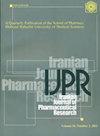Glucose Metabolism in Acute Myeloid Leukemia Cell Line Is Regulated via Combinational PI3K/AKT/mTOR Pathway Inhibitors
IF 1.8
4区 医学
Q3 PHARMACOLOGY & PHARMACY
引用次数: 0
Abstract
Background: Metabolism reprogramming is a survival mechanism in acute myeloid leukemia (AML) cells in the tumor microenvironment. Therefore, we investigated the effect of signaling pathway inhibitors on the expression of genes rewired in the metabolic pathway of AML cells. Methods: HL-60 cells were treated with Idelalisib, MK-2206, and Everolimus, which respectively are selective inhibitors of phosphatidylinositol-3-kinase (PI3K), AKT, and the mammalian target of rapamycin (mTOR), either individually or in combination. The relative expressions of Glucose Transporter 1, Hexokinase 2, Pyruvate Kinase, Pyruvate Dehydrogenase E1, Citrate synthase, Isocitrate Dehydrogenase 2, and Hypoxia Inducible Factor 1 Subunit Alpha were determined by real-time PCR. Results: The combined treatment of HL-60 cells with Idelalisib, MK-2206, and Everolimus decreased the expression of Glucose Transporter 1, Hexokinase 2, Pyruvate Kinase M2, Pyruvate Dehydrogenase E1, Citrate synthase, Isocitrate Dehydrogenase 2, and Hypoxia Inducible Factor 1 Subunit Alpha. Conclusions: A combination of PI3K/AKT/mTOR pathway inhibitors regulates the expression of genes involved in glycolysis, Pyruvate Dehydrogenase Complex (PDH), and the tricarboxylic acid (TCA) cycle and interferes with metabolic reprogramming and immune evasion mechanisms of AML leukemic cells. Combinational therapy approaches to block these pathways might be a promising and novel therapeutic strategy for targeting the metabolic requirements of AML cells.PI3K/AKT/mTOR通路联合抑制剂调控急性髓系白血病细胞的糖代谢
背景:代谢重编程是急性髓系白血病(AML)细胞在肿瘤微环境中的一种生存机制。因此,我们研究了信号通路抑制剂对AML细胞代谢通路中基因重组表达的影响。方法:分别用磷脂酰肌醇-3激酶(PI3K)、AKT和哺乳动物雷帕霉素靶点(mTOR)的选择性抑制剂Idelalisib、MK-2206和依维莫司(Everolimus)单独或联合处理HL-60细胞。实时荧光定量PCR检测葡萄糖转运蛋白1、己糖激酶2、丙酮酸激酶、丙酮酸脱氢酶E1、柠檬酸合成酶、异柠檬酸脱氢酶2和缺氧诱导因子1亚单位α的相对表达量。结果:Idelalisib、MK-2206和依维莫司联合作用HL-60细胞后,葡萄糖转运蛋白1、己糖激酶2、丙酮酸激酶M2、丙酮酸脱氢酶E1、柠檬酸合成酶、异柠檬酸脱氢酶2和缺氧诱导因子1亚单位α的表达均降低。结论:PI3K/AKT/mTOR通路抑制剂联合调控糖酵解、丙酮酸脱氢酶复合物(PDH)和三羧酸(TCA)循环相关基因的表达,干扰AML白血病细胞的代谢重编程和免疫逃避机制。阻断这些通路的联合治疗方法可能是针对AML细胞代谢需求的一种有前途的新治疗策略。
本文章由计算机程序翻译,如有差异,请以英文原文为准。
求助全文
约1分钟内获得全文
求助全文
来源期刊
CiteScore
3.40
自引率
6.20%
发文量
52
审稿时长
2 months
期刊介绍:
The Iranian Journal of Pharmaceutical Research (IJPR) is a peer-reviewed multi-disciplinary pharmaceutical publication, scheduled to appear quarterly and serve as a means for scientific information exchange in the international pharmaceutical forum. Specific scientific topics of interest to the journal include, but are not limited to: pharmaceutics, industrial pharmacy, pharmacognosy, toxicology, medicinal chemistry, novel analytical methods for drug characterization, computational and modeling approaches to drug design, bio-medical experience, clinical investigation, rational drug prescribing, pharmacoeconomics, biotechnology, nanotechnology, biopharmaceutics and physical pharmacy.

 求助内容:
求助内容: 应助结果提醒方式:
应助结果提醒方式:


